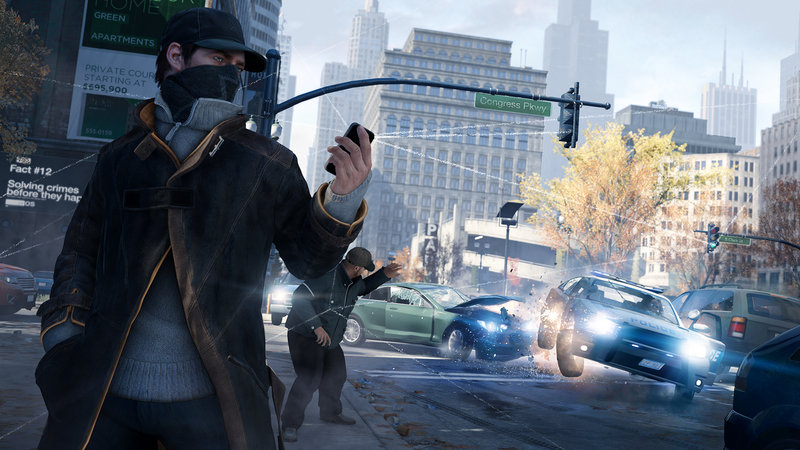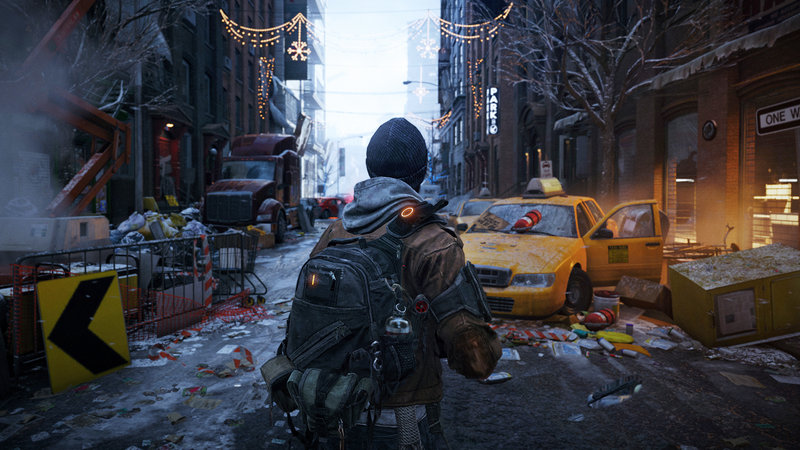LOS ANGELES – Across the dizzying, colorful show floor at last week’s Electronic Entertainment Expo, there were games on display where players could become all manner of things, like a throat-slashing 18th-century pirate, zombie killer, guardian of the last city on earth, music-making sorcerer, ruthless Roman general, shape-shifting creature, goblin slayer and Batman.
But the role that seems to have captured the most buzz from the gaming community is one that’s far less fantastical but surprisingly topical: an eavesdropping hacker. One of several surveillance-related games at E3, “Watch Dogs” casts players as Aiden Pearce, a vigilante who can tap into security cameras and listen in on phone calls across a virtual rendition of an automated Chicago.
“Watch Dogs” is set amid an urban open world similar to that of a “Grand Theft Auto” game. As players move through the city as Pearce, they can scan computer-controlled passers-by with a smartphone to glean such details as income, age, credit score, employment, criminal and bank account records. (“Frequents fetish porn sites,” one particularly brazen description reads.)
The timing of “Watch Dogs” is remarkable in light of recent revelations about the National Security Agency’s controversial data-collection programs. They were revealed in media stories by The Guardian and The Washington Post, leaked by former NSA contractor Edward Snowden. Is “Watch Dogs” a case of a video game imitating life — or the other way around?
“We’re just as surprised as everyone else,” said Dominic Guay, senior producer at Ubisoft Montreal. “We’ve been working on this game for the past five years and locked down the script last year. These events keep transpiring in the news — whether it’s the NSA or using a cellphone to hack into a car — that mirror the ideas that we have in the game.”
Guay acknowledged Pearce’s morality isn’t called into question as players employ Chicago’s fictional Central Operating System, ominously called ctOS, to peep on digital lives.
Instead, players’ actions affect Pearce’s reputation. For example, if he hacks into traffic lights and causes havoc on the street, a TV news report about the incident might pop up on a nearby screen.
A demonstration last week of “Watch Dogs” at Sony’s presentation at E3, the largest annual gathering of the gaming industry, showed Pearce hacking a gate open while driving through Chicago, eavesdropping on a man alerting 911 about Pearce’s presence as he exited a cafe, as well as inciting a city-wide blackout when Pearce was confronted by police officers.
“I think ‘Watch Dogs’ is appealing to people because they can relate to it,” said Laurent Detoc, North America president of Ubisoft. “It’s a very relevant topic and an extremely ambitious project for us. Because people have been talking about this game for the past year, it’s now up to us to confirm that ‘Watch Dogs’ is what people expected it to be.”
In a sea of sequels and shooters at E3, “Watch Dogs” stands out as a game that could be reflective about contemporary culture, a feat many games can’t achieve given their long production schedules. While arguably provocative, the question remains whether gamers will actually want to play out the always-connected Orwellian situation Ubisoft has concocted.
“We all want to know what will happen and what we should do with these machines that are becoming more and more intelligent,” said Yves Guillemot, CEO of Ubisoft. “We are organizing the world differently. Being able to go and virtually experience, that is something we love to do, and we think it’s something our consumers will also love.”
“Watch Dogs” wasn’t the only game hyped at E3 that features ripped-from-the-headlines realness. “Tom Clancy’s The Division,” another third-person action game from Ubisoft, is inspired by real-world U.S. government directives about catastrophic emergencies. Players portray sleeper agents in New York following a bio-terrorist attack on Black Friday.
“One of the things that we’re really interested in is this situation where the player actually only has 72 hours until they start running into problems themselves,” said David Polfeldt, managing director of Ubisoft Massive.
“They will need water. There’s a survival mechanism in the game. Definitely, they will need to find better weapons, ammo and gear.”
“Infamous: Second Son,” the third installment in Sony’s superhero “Infamous” series, tasks new protagonist Deslin Rowe with destroying surveillance equipment and battling agents of the fictional Department of United Protection. In the game, the government has set up a network of security cameras to keep track of a burgeoning population of superhumans.
“We wanted to tell a story that asks important questions,” said Brian Fleming, co-founder of Sucker Punch Productions. “How much freedom should we sacrifice in the name of security?”
Despite tackling such serious subject matter, Fleming noted that the game’s developers didn’t have “any preachy answers. We didn’t want a screed about how all this is bad,” said Fleming.
Send questions/comments to the editors.





Success. Please wait for the page to reload. If the page does not reload within 5 seconds, please refresh the page.
Enter your email and password to access comments.
Hi, to comment on stories you must . This profile is in addition to your subscription and website login.
Already have a commenting profile? .
Invalid username/password.
Please check your email to confirm and complete your registration.
Only subscribers are eligible to post comments. Please subscribe or login first for digital access. Here’s why.
Use the form below to reset your password. When you've submitted your account email, we will send an email with a reset code.